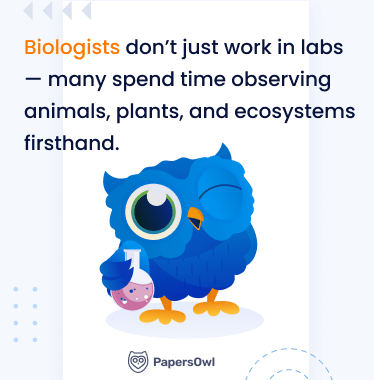225 Biology Research Topics for Your Paper
Table of contents
- 1 What Is Biology and What Do Biologists Study?
- 2 How to Choose Biology Research Paper Topics?
- 3 Top Biology Research Topics by Field
- 3.1 Developmental Biology Topics for Research
- 3.2 Immune System Biology Topics to Research
- 3.3 Cell Biology Topics for Research
- 3.4 DNA and Genetics Research Topics
- 3.5 Molecular Biology Topics for Research
- 3.6 Neurobiology Topics for Research
- 3.7 Human Cloning, Abortion, and Genetic Research Topics
- 3.8 Environmental and Ecology Research Topics
- 3.9 Plant Pathology Topics for Research
- 3.10 Animal Life Topics for Research
- 3.11 Marine Biology Research Topics
- 3.12 Zoology Topics for Research
- 3.13 Genetics and Gene Regulation Topics for Research
- 3.14 Biotechnology and Regenerative Medicine Topics for Research
- 3.15 Evolutionary Topics for Research
- 4 Common Mistakes in Biology Papers
- 5 Conclusion
Are you looking for research topics for high school students? This article provides a comprehensive list of biology research topics for your projects.
It covers key areas in biology and offers ideas for research and biology research paper topics. You will find topics suitable for different levels, from high school to college, making your next project easier and more focused!
What Is Biology and What Do Biologists Study?
Biology explores living organisms and how they interact with the world. Biologists focus on biology related topics like cell functions, ecosystems, and species evolution.
Some ways to improve in biology include observing local flora, running small experiments, or tracking bee populations. Understanding these systems helps researchers identify gaps in research areas.
Other biologists also study animal behavior, while others explore microbial life or plant growth. These insights help us understand life’s processes and diversity.

How to Choose Biology Research Paper Topics?
Choosing a topic can feel overwhelming, and while you could pay someone to write your paper, following these steps will help you discover interesting topics in biology and build confidence in your own work.
- Step 1: Explore research areas.
Look at different research areas, such as ecosystems, genetics, or cellular processes. Choose something that genuinely sparks curiosity. - Step 2: Identify a good biology research topic.
A good biology research topic might include studying antibiotic resistance, monitoring soil pollution, or investigating stem cells.. - Step 3: Plan your research process.
Organize your work by defining a clear question, gathering evidence, and analyzing results. Use charts or tables to simplify complex data. - Step 4: Seek guidance if needed.
You can consult research paper writing services for formatting, topic ideas, or tips — but avoid copying work directly.
These steps ensure your topic is manageable, unique, and aligned with your academic goals. For additional examples, consult with experts or buy a biology paper.
Top Biology Research Topics by Field
Exploring easy biology research topics opens doors to experimental thinking and practical discoveries. Biology research spans living systems, development, and evolutionary patterns. Using Papersowl.com can guide students toward structured projects and innovative research ideas.
Developmental Biology Topics for Research
Developmental biology studies growth from cells to full organisms. Focusing on cellular functions and functional biostructures helps uncover evolution’s intricate pathways. These interesting biology topics deepen insight into how organisms adapt and develop over time.
- Growth and maturation stages in isolated populations
- Evolution of limb regeneration in amphibians
- Cellular functions during early embryonic growth
- Role of biological systems in aging
- Developmental impacts of environmental stressors
- Evolution of sensory organs in deep-sea populations
- Genetic basis of growth rate differences
- Developmental pathways in brain maturation
- Evolutionary trends in reproductive biology
- Cell operations in wound healing
- Hormonal influence on human development
- Cross-species comparison of organ formation
- Epigenetic control of biological systems
- Impact of nutrition on development
- Evolution of developmental patterns in insects
Immune System Biology Topics to Research
Biology research topics for grade 12 students in immunology reveal how the immune system defends the body. Understanding autoimmune responses and intestinal microbiome interactions can inspire research projects with real-world health implications.
- Genetic adaptations to environmental stressors
- Autoimmune diseases in isolated communities
- Intestinal microbiome influence on immunity
- Vaccination effects on human health
- Interaction between the immune system and nutrition
- Human ailments linked to genetic factors
- Immune system adaptation to pathogens
- Seasonal variation in immune responses
- Environmental triggers of autoimmune diseases
- Immune system development in infancy
- Gut microbiota and mental health connections
- Effects of air pollution on immunity
- Immune responses in aquatic fauna
- Human health impacts of invasive species
- Immune system resilience and lifestyle
Cell Biology Topics for Research
Cellular biology explores the machinery of life. Biology projects for high school students can investigate cellular mechanisms, protein interactions, or energy cycles, building foundational knowledge for advanced studies.
- Cellular mechanisms in tissue regeneration
- Cellular biology of photosynthetic organisms
- Cellular biology in extremophiles
- Microorganisms and nutrient cycles
- Stem cells in tissue regeneration
- Cell operations in wound repair
- Role of cellular biology in aging
- Signaling pathways in cell differentiation
- Effects of environmental stress on cells
- Cellular processes in neurodegeneration
- Comparative cellular science in mammals
- Cell biology of the intestinal microbiome
- Mechanisms of cellular repair
- Cellular biology in plant immunity
- Chemical processes within cell membranes
DNA and Genetics Research Topics
Genetics research reveals how gene expression and regulation shape organisms. Studying inheritance patterns, gene therapy, or microbiome influences helps students see links between microscopic structures and broader biological outcomes.
- Gene expression patterns in isolated populations
- Gene therapy advancements for rare diseases
- Gut microbiome influence on genetic expression
- Genetic basis of human longevity
- DNA mutations in extreme environments
- Epigenetic modifications across generations
- Ethical aspects of gene editing
- Comparative genomics of ancient crops
- DNA repair mechanisms in marine organisms
- Inherited diseases and DNA transcription
- Genomic diversity in endangered species
- CRISPR applications in cell repair treatment
- DNA fingerprinting in wildlife conservation
- Human genetic variation and disease susceptibility
- Chromosome abnormalities and disease prevalence
Molecular Biology Topics for Research
Molecular biology examines life at the microscopic level. Topics like protein interactions, chemical reactions, and gut microbiome studies show how microscopic processes drive macroscopic phenomena in living organisms.
- Biomolecular science of photosynthesis in unusual plants
- Protein-protein interactions in neural cells
- Chemical reactions in metabolic pathways
- Molecular-level adaptations to high altitude
- Gut microbiome influence on metabolism
- Biomolecular science in stem cell therapy
- Microscopic organisms as molecular study models
- Protein-protein interactions in cancer therapy
- Molecular signaling in regenerative medicine
- Biomolecular science of antibiotic resistance
- Molecular mechanisms of environmental adaptation
- Enzyme activity under chemical stress
- Molecular-level impact of pollutants
- Protein folding disorders in human diseases
- Molecular pathways in cellular repair

Neurobiology Topics for Research
Cool biology topics in neurobiology explore the neural network and cognitive activity. Studying neural pathways or dietary effects on cognition helps explain behavior and health through tangible, student-friendly experiments.
- |Neural network development in children
- Brain function under sleep deprivation
- Understanding cognitive differences in urban environments
- Immune system influence on neurodegenerative diseases
- Effects of diet on neural network health
- Cognitive activity in high-altitude populations
- Neurobiology of memory formation
- Impact of toxins on the neural network
- Neural pathways in sensory processing
- Understanding brain plasticity
- Neurodegenerative disease prevention strategies
- Nervous system adaptation in extreme climates
- Brain function in response to stress
- Role of gut microbiota in neurobiology
- Neural responses to artificial light
Human Cloning, Abortion, and Genetic Research Topics
Human biology research topics in ethics and genetics examine human body manipulation, cell restoration therapy, and neurodegenerative disorders. They challenge students to consider moral frameworks while exploring scientific frontiers.
- Ethical considerations in human cloning
- Cell restoration therapy and organ replacement
- CRISPR for neurodegenerative repair
- Genetic research in rare disorders
- Abortion policies and public health ethics
- Human body regeneration mechanisms
- Cloning techniques for endangered species
- Ethical considerations in stem cell therapy
- Gene editing and human disease prevention
- Genomic studies of hereditary diseases
- Human cloning debates in different cultures
- Cell restoration therapy in spinal injuries
- Ethical aspects of prenatal genetic screening
- Using organ-on-a-chip systems to study neurodegenerative disorders
- Human body adaptation to synthetic biology
Environmental and Ecology Research Topics
Fun biology topics in ecology reveal the effects of climate change, ecological balance, and conservation efforts. These research areas show how organisms interact with habitats and adapt to environmental pressures.
- Climate change effects on urban ecosystems
- Ecosystem stability in fragmented habitats
- Environmental issues: acid rain and soil health
- Conservation efforts for bee populations
- Climate change impact on marine life
- Habitat fragmentation and population survival
- City soundscapes and wildlife behavior
- Air pollution effects on plant growth
- Coral reefs in changing climates
- Acid rain and chemical processes in lakes
- Conservation efforts in Aboriginal farming lands
- Urban environments and noise pollution impact
- Marine life biodiversity under climate stress
- Ecosystem stability in extreme weather events
- Invasive populations colonizing unfamiliar habitats
Plant Pathology Topics for Research
Plant pathology topics uncover how invasive species, climate change, and the environment influence plant health. Studying cellular biology in this context highlights mechanisms that drive adaptation and survival.
- Effects of non-native organisms on native plants
- Cellular biology of plant disease resistance
- Climate change and fungal pathogen spread
- Plant adaptation to new environments
- Impact of changing environment on root growth
- Viral infections in agricultural crops
- Cellular responses to drought stress
- Non-native organisms and soil microbiome disruption
- Plant immunity under temperature extremes
- Fungal interactions with native flora
- Climate change effects on seed germination
- Cellular mechanisms in pathogen recognition
- Spread of plant diseases in urban areas
- New environments and pollinator-plant relationships
- Microbial diversity shifts in stressed ecosystems
Animal Life Topics for Research
These research ideas about animals explore adaptation, social behaviors, and survival strategies under environmental stress. These topics link evolutionary trends with real-world population dynamics.
- How animals adapt to urbanization
- Social interactions in small animal populations
- Polar bears’ hunting patterns under ice loss
- Behavioral changes in animals during climate change
- Adaptive strategies in migratory populations
- Animal species competition in shrinking habitats
- Evolution of camouflage in forest animals
- Effects of temperature on reproduction cycles
- Polar bears and food scarcity challenges
- Social hierarchy in primates
- Stress responses in wildlife populations
- Animals adapt to pollution in rivers
- Role of scent marking in social interactions
- Seasonal migration impacts on animal health
- Climate change and predator-prey balance
Marine Biology Research Topics
Aquatic biology project ideas examine water-based habitats and endangered species adaptation. Research in this area highlights human impacts and conservation strategies for oceanic life.
- Coral reefs’ response to rising ocean temperatures
- Marine life adaptation to acidifying oceans
- Noise pollution’s impact on whale communication
- Endangered species adapt to overfishing
- Aquatic ecosystems’ resilience to plastic pollution
- Migration patterns of sea turtles
- Coral bleaching and ecosystem collapse
- Aquatic biology of deep-sea organisms
- Human activity effects on coastal ecosystems
- Noise pollution and fish schooling behavior
- Aquatic non-native organisms’ impact on biodiversity
- Aquatic fauna feeding strategies under stress
- Ocean currents and larval dispersal
- Endangered species adapt to habitat fragmentation
- Microplastic accumulation in marine food chains
Zoology Topics for Research
Zoology research investigates animal communication and behavioral ecology. These topics allow students to connect observable patterns with underlying biological mechanisms.
- Animal communication in nocturnal populations.
- Population dynamics of urban mammals
- Impact of urban sounds on biological signaling
- Group behavior in herd animals
- Seasonal changes in mating rituals
- Animal communication in marine mammals
- Migration patterns in small rodents
- Predator-prey interactions in forests
- Biological group dynamics in endangered species
- Urbanization and animal territoriality
- Social learning in pack animals
- Noise pollution and nesting success
- Communication signals in amphibians
- Population genetics and survival rates
- Behavioral adaptation to environmental stressors
Genetics and Gene Regulation Topics for Research
Exploring genetics and genetic control reveals genetic diversity, mental health links, and cancer cell behavior. Students can study inheritance, therapy options, and diet influences on DNA transcription.
- Genetic diversity in isolated populations
- Gene therapy applications for rare diseases
- Genetic factors in cancer cells
- Influence of different diets on DNA transcription
- Mental health and heritable traits
- Epigenetic control of development
- Genetic regulation of immune responses
- Heritable resistance to infectious diseases
- Gene editing in cell restoration therapy
- Genetic markers in population studies
- Interaction of genetics and nutrition
- Cancer cell mutation mechanisms
- Genetic control under environmental stress
- Genetic diversity in crop species
- Molecular genomic studies of behavioral traits
Biotechnology and Regenerative Medicine Topics for Research
Biotechnology and cell restoration therapy topics include constructive biology and combating antibiotic resistance. These research areas merge innovation with practical solutions for human health challenges.
- Synthetic biology in microbial engineering
- Antibiotic resistance and synthetic treatments
- Tissue regeneration using stem cells
- 3D bioprinting of organs
- Biotechnology in rare disease therapies
- Cell restoration therapy in spinal injuries
- Synthetic biology in crop improvement
- How bacteria develop defenses against antibiotics
- Biotech solutions for environmental remediation
- Regenerative medicine in heart repair
- Constructive biology in pharmaceutical production
- Cell-based therapies for neurodegeneration
- Genetic engineering for disease prevention
- Biotech approaches to tissue scaffolds
- Antimicrobial resistance and global health challenges
Evolutionary Topics for Research
Evolutionary topics reveal development patterns, adaptive strategies, and environmental pressures shaping organisms. Students can study how organisms evolve and respond to ecological changes.
- Evolution of antibiotic resistance in bacteria
- Development of camouflage in predator-prey systems
- Organism adaptation to fragmented habitats
- Exploring human-made waste impacts on evolutionary processes
- Evolutionary changes in marine populations
- Developmental plasticity in response to climate change
- Evolution of reproductive strategies in mammals
- Population competition in changing habitats
- Evolutionary role of symbiotic relationships
- Understanding gene flow in fragmented populations
- Antibiotic resistance and microbial evolution
- Evolution of social behavior in primates
- Developmental genetics and population diversity
- Plastic pollution impact on aquatic evolution
- Tracing evolutionary patterns in plant populations
Common Mistakes in Biology Papers
- Picking a topic that’s too broad.
- Forgetting to define key terms.
- Using unreliable online sources.
- Copying without proper citation.
- Ignoring diagrams or data presentation.
Conclusion
Observing patterns in biology research paper topics can inspire new questions. They raise new approaches for other researchers. Even small discoveries can illuminate bigger patterns. The goal is to contribute meaningful insight. Your work can stand out and create a lasting impact with careful topic selection and diligent investigation.







